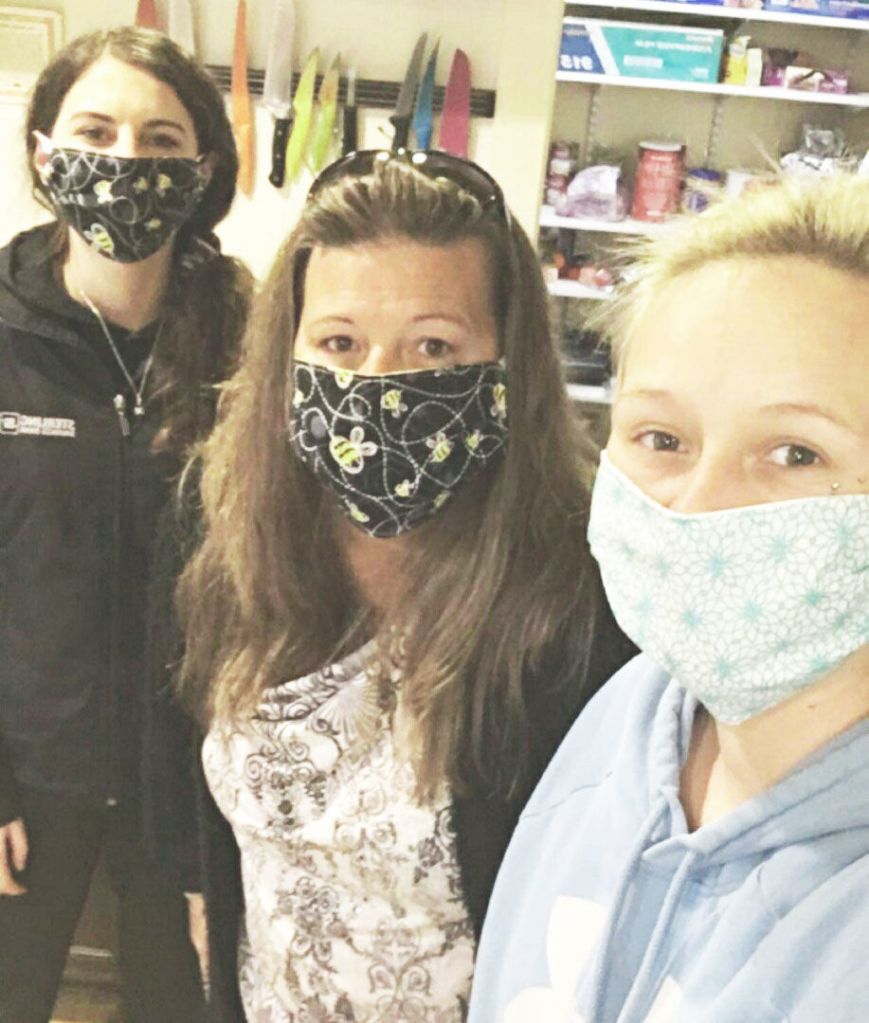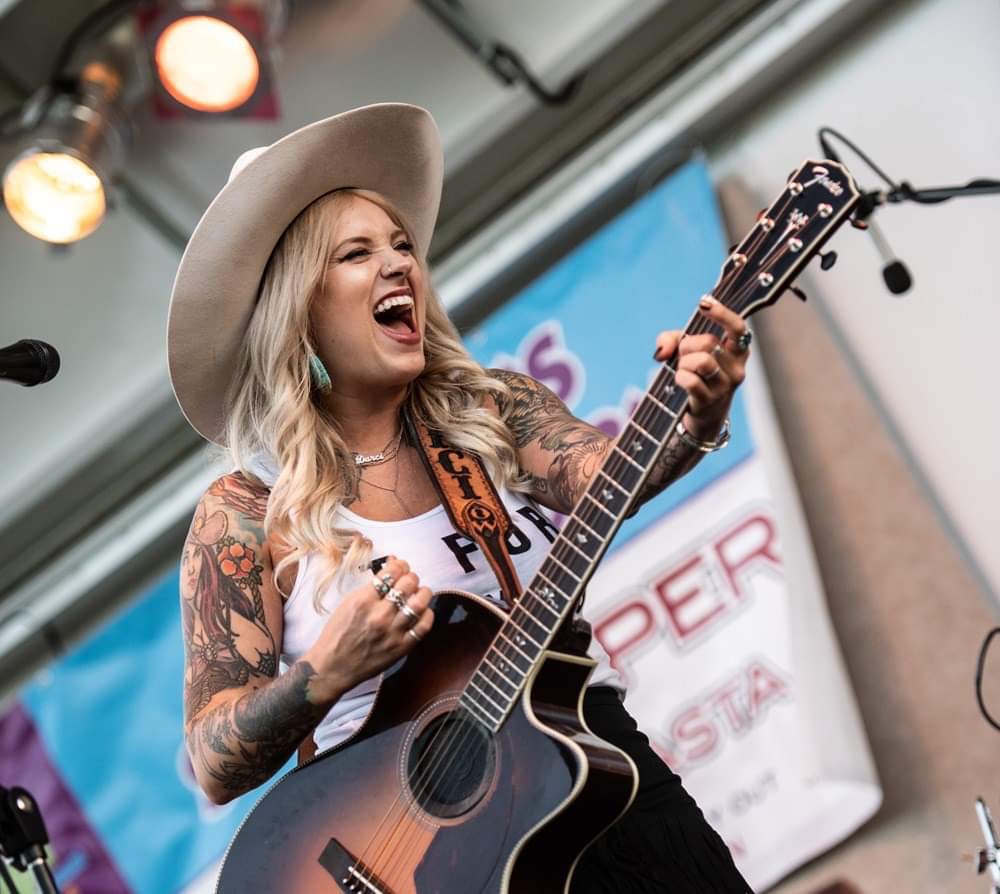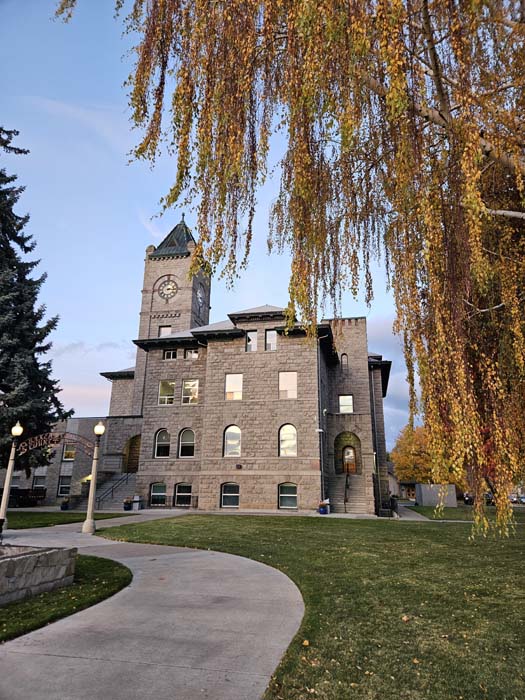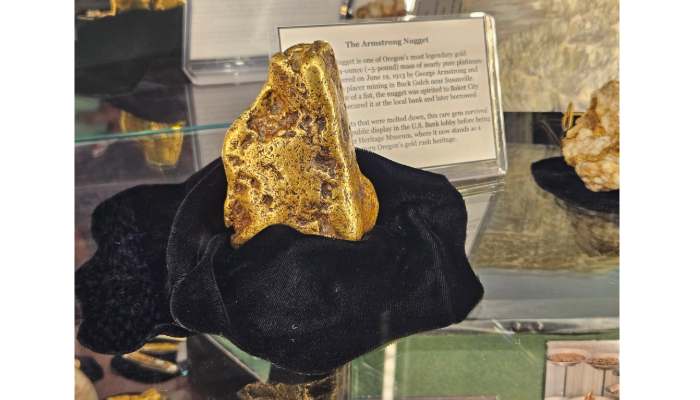Sewing Support
Published 10:00 am Saturday, April 4, 2020

- From left to right, Salena Cullum, Nicole Howerton and Sierra Howerton Johnson, who all work at Memory Lane, wearing face masks made by Linda Wentworth.
In searching for ways to make productive use of their time and to help others during the coronavirus crisis, Baker County seamstresses are crafting medical masks and gowns in case of a shortage.
Trending
Cherrie Carlson-Conklin, 70, who took up sewing at the age of 5 following in the footsteps of her mother and grandmother, is making masks in her leisure while recovering from knee surgery.
She’s done research over the internet to develop what she says is a design superior to other homemade masks.
“They are more difficult to make,” Carlson-Conklin says, but she has the experience to construct them on the Bernina sewing machine she’s been using for most of her life.
Trending
Instead of wires to crimp the mask tight over the nose, her design features darts to keep the fabric close to the nose and more darts to ensure a tight fit under the chin.
She adds a layer of interfacing to stiffen the masks, which also adds another layer of protection.
Carlson-Conklin first made some masks to send to a girlfriend whose husband is immunocompromised.
She says she turned to her scrap pile of fabric, elastic, interfacing and thread accumulated over the year for supplies to make the masks.
Carlson-Conklin said that as a child she started out sewing simple squares, progressing to doll clothes and later to wedding dresses and men’s suits. She’s also a quilter.
“When my mother died 18 to 20 years ago, she had these boxes of quilt pieces,” she says, some of which were brought to their Portland home when her grandmother moved from Nebraska to live with them when she was a youngster.
Over the years, she’s sewn those pieces into quilts for all the next generation of children as they married.
“I’m on No. 9 out of 11,” she said. “They all got a quilt from great-grandma and me.”
Carlson-Conklin’s mother, Helen Carlson, worked at the Jantzen Knitting Mills in Portland for many years where she became an expert seamstress. She passed those skills to her four daughters, with Cherrie making the most of those lessons over the years.
When she wasn’t sewing, Carlson-Conklin worked as a substitute teacher for Baker School District for 31 years and spent 20 years of that time working as a librarian for Baker County. Her husband, Darrell Conklin, 69, retired in 2009 from the Baker County Road Department.
Cherrie says she and her husband support each other in their hobbies.
“He golfs and I sew,” she said.
Since social distancing orders have been in place because of the pandemic, both are staying home as much as possible.
Carlson-Conklin says her mother would have loved to have joined her in her latest sewing project.
“She’d be right in there helping,” she said.
Mass production is not Carlson-Conklin’s goal at this time.
She came out of surgery on March 9, “just two days before this all started,” she said, after suffering with knee pain for about five years. Now she receives physical therapy every other day.
“I only have six right now,” she said Tuesday of her face mask sewing project. “I do them when I want to. It takes about an hour.”
She’s not sure what she’ll do with her face masks at this point.
“When I get the time I’ll deliver them to somebody,” she says. “I’ll ask if they need them. Next month they might need them.”
If not, maybe she’ll keep them for herself.
“For when I’m really old,” she says.
Made by request for friends and family
Linda Wentworth, 64, another longtime Baker City seamstress who says she started sewing in grade school, took on the mask sewing project at the request of her neighbor, Nicole Howerton, who works at Memory Lane care center.
Howerton provided the elastic for the masks and a pattern she found on YouTube.
“And I have lots of fabric, so I started sewing to keep myself busy,” Wentworth wrote in an email to the Herald. “I am even mailing some to family in Bend.”
Wentworth is the grandma in Grandma’s Gang, a home-based child care service. She’s in her 47th year of providing in-home child care.
She found herself with time on her hands when her husband, Gary, was flown by Life Flight to an Idaho hospital on Jan. 13 with a heart issue.
He came home on March 26 and Linda has taken two weeks off while her husband, who works at Farm & Industrial, adjusts to being home while he continues his recovery. She says she’ll take more time off if necessary.
“It’s by choice,” she wrote in her email. “I cannot risk him being exposed to any sort of bug.”
The sewing project fills her days and allows her to be nearby in case her husband needs her.
“They are fun and easy to make, and although they do not meet any kind of standards, they are better than nothing, right?”
Wentworth is a registered child care provider who will be allowed to stay open when she decides to return to her job of caring for the children of essential workers, which most of her families are, she said.
“I hate even closing for two weeks, but my husband is priority and my day care families completely understand,” she said.
Wentworth has used the masks she has produced at home as well, such as when her husband’s home care providers come by to check on him.
“They wear masks and use the sanitizer I have by my door,” she said.
Wentworth plans to put her handiwork to use when she resumes offering child care as well.
“We will definitely be using masks!” she wrote in her email. “This is not a virus to take chances with.”
Patterns
Patterns for masks are available online from various sources.
A pattern for an “isolation gown,” worn by medical workers to protect their upper body, has been designed in Baker City by Amy Hindman of Peekaboo Pattern Shop.
Amy, 32, and her husband, Jeremy, 33, operate their digital pattern design company from their Baker Valley home and employ workers to ship fabric from their warehouse, which was completed in October, on Settler’s Loop in the Elkhorn View Industrial Park. The home-based business works well for the couple as they raise their four children, Jeremy Hindman said.
Amy designed the pattern, in sizes ranging from small to extra-large, at the request her cousin, Jon Parkinson, and his wife, Marti.
Marti is an urgent care nurse in Arizona who was running short of the gowns she uses at work.
Jeremy said the Parkinsons turned to Amy for help in producing a pattern because they knew about the Hindmans’ business and they had looked elsewhere for a pattern without success.
Jeremy said Amy spent about 10 hours perfecting the design on a computer and creating one herself before making it available for free downloading to the public. She also sent a gown to her cousin’s wife.
Since the free digital pattern was made available on the Hindmans’ business website, as of Tuesday it had been downloaded 3,500 times to people from all over the world, Jeremy said.
Among their customers are doctors and nurses, individual seamstresses and members of sewing groups.
The free pattern is available at peekaboopatternshop.com/isolation-gown/
The pattern includes this disclaimer:
Note: This pattern is for an isolation style gown. A handmade gown will not provide the same protection as a commercial gown. Your choice of fabric will impact the level of protection provided. If you are sewing gowns to donate, contact the organization prior to starting your project to verify the style needed and required type of fabric.
The Hindmans have no plans to sell the pattern.
“It was a thing to do to try to help out,” Jeremy said. “We’re trying to help where it’s needed right now.”









